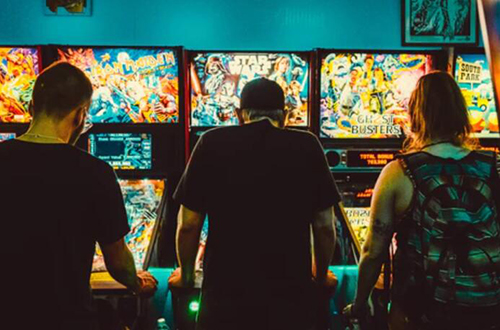How were arcade games programmed?
Views: 3245 Update date: Sep 15,2023
Arcade games were programmed using a variety of methods and technologies depending on the era, but I'll provide a general overview of the process involved in programming arcade games. Keep in mind that technology and tools have evolved significantly over time, so the specific methods used may vary for different generations of arcade games.
1. Hardware Platform: Arcade games typically ran on dedicated hardware platforms designed specifically for gaming. These platforms included custom-made arcade boards or cabinets with unique hardware components, such as CPUs, GPUs, sound chips, and input/output interfaces. Programmers needed to have a deep understanding of this hardware to create games efficiently.
2. Programming Language: Early arcade games, like those from the late 1970s and early 1980s, were often programmed in assembly language. Assembly language allowed for precise control over the hardware and memory, which was crucial for achieving optimal performance on limited hardware resources.
5. Graphics and Sprites: Creating the graphics for arcade games required specialized tools and techniques. Artists and designers worked on pixel art, sprites, and backgrounds. Programmers wrote code to display and animate these graphics on the screen, often with very limited graphical capabilities compared to modern systems.
6. Sound and Music: Arcade games featured custom sound and music. Sound engineers and composers created audio assets, and programmers wrote code to play these sounds and music using dedicated sound chips in the arcade hardware.
7. Testing and Debugging: Extensive testing and debugging were critical to ensuring the game ran smoothly and was free of glitches or crashes. Arcade games needed to be very stable since they were placed in public venues where malfunctions were costly.
8. Optimization: Given the limited processing power and memory of arcade hardware, programmers had to optimize their code rigorously. This involved making code as efficient as possible, often through manual memory management and other low-level techniques.
9. Hardware-specific Programming: Arcade games often had to be fine-tuned to work on specific hardware configurations. This sometimes required tweaking code or settings for different arcade cabinets or platforms.
10. Distribution: Once the game was completed and thoroughly tested, it was distributed to arcades. This typically involved physically delivering arcade boards or cabinets to the locations where they would be installed.
11. Maintenance and Updates: After release, arcade games might require maintenance and updates to address any issues that emerged in the field or to add new features. Programmers were responsible for these ongoing tasks.
It's important to note that the specific tools and technologies used for arcade game programming evolved over time, with later generations of arcade games benefiting from more advanced hardware and development environments. Today, modern arcade games often run on PC-based platforms and are developed using high-level programming languages and game engines, making the development process more accessible and efficient.
Prev News:Quotes of Lucky 7 Prize Vending Game from Clients
Next News:What is an arcade PCB?
1. Hardware Platform: Arcade games typically ran on dedicated hardware platforms designed specifically for gaming. These platforms included custom-made arcade boards or cabinets with unique hardware components, such as CPUs, GPUs, sound chips, and input/output interfaces. Programmers needed to have a deep understanding of this hardware to create games efficiently.
2. Programming Language: Early arcade games, like those from the late 1970s and early 1980s, were often programmed in assembly language. Assembly language allowed for precise control over the hardware and memory, which was crucial for achieving optimal performance on limited hardware resources.
3. Game Design: Before programming begins, the game's concept and design are established. Game designers outline the gameplay mechanics, graphics, sound effects, and overall objectives. Programmers work closely with designers to understand the game's requirements.

5. Graphics and Sprites: Creating the graphics for arcade games required specialized tools and techniques. Artists and designers worked on pixel art, sprites, and backgrounds. Programmers wrote code to display and animate these graphics on the screen, often with very limited graphical capabilities compared to modern systems.
6. Sound and Music: Arcade games featured custom sound and music. Sound engineers and composers created audio assets, and programmers wrote code to play these sounds and music using dedicated sound chips in the arcade hardware.
7. Testing and Debugging: Extensive testing and debugging were critical to ensuring the game ran smoothly and was free of glitches or crashes. Arcade games needed to be very stable since they were placed in public venues where malfunctions were costly.
8. Optimization: Given the limited processing power and memory of arcade hardware, programmers had to optimize their code rigorously. This involved making code as efficient as possible, often through manual memory management and other low-level techniques.
9. Hardware-specific Programming: Arcade games often had to be fine-tuned to work on specific hardware configurations. This sometimes required tweaking code or settings for different arcade cabinets or platforms.
10. Distribution: Once the game was completed and thoroughly tested, it was distributed to arcades. This typically involved physically delivering arcade boards or cabinets to the locations where they would be installed.
11. Maintenance and Updates: After release, arcade games might require maintenance and updates to address any issues that emerged in the field or to add new features. Programmers were responsible for these ongoing tasks.
It's important to note that the specific tools and technologies used for arcade game programming evolved over time, with later generations of arcade games benefiting from more advanced hardware and development environments. Today, modern arcade games often run on PC-based platforms and are developed using high-level programming languages and game engines, making the development process more accessible and efficient.
